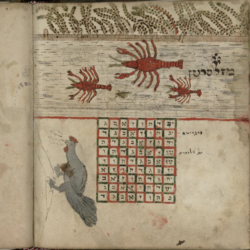| Source (Hebrew) | Translation (English) |
|---|---|
אֱלֹהֵינוּ וֵאלֹהֵי אֲבוֹתֵינוּ |
Our elo’ah and the elo’ah of our fathers |
אָתָאנוּ־לְךָ יוֹצֵר רוּחוֹת בְּרוֹב עֲוֺנֵינוּ כָּבְדוּ אֲנָחוֹת גְּזֵרוֹת עָצְמוּ וְרַבּוּ צְרִיחוֹת כִּי בְּשִׁבְעָה עָשָׂר בְּתַמּוּז נִשְׁתַּבְּרוּ הַלּוּחוֹת׃ |
We have come before you, Creator of spirits, heavily sighing with the multitude of our iniquities, and lamenting sorely because of the hard decrees, for on the 17th of Tammuz the holy stelae were broken. |
גָּלִינוּ מִבֵּית הַבְּחִירָה דִּינֵנוּ נֶחְתַּם וְנִגְזְרָה גְזֵרָה וְחָשְׁכָה בַּעֲדֵנוּ אוֹרָה כִּי בְּשִׁבְעָה עָשָׂר בְּתַמּוּז נִשְׂרְפָה הַתּוֹרָה׃ |
We were exiled from your chosen house, and the light was darkened for us; our sentence was sealed, and the decree was carried out, for on the 17th of Tammuz the holy Torah was burnt.[1] By a certain Appostemus, a Greek prince, who is said to have lived in the time of the second temple. See Taanith 4.6. |
הָרְסוּ אוֹיְבֵינוּ אֶת־הַהֵיכָל וּבָרְחָה שְׁכִינָה מִזָּוִיּוֹת הֵיכָל וְנִמְסַרְנוּ בְּיַד זֵדִים לִהִתְאַכָּל כִּי בְּשִׁבְעָה עָשָׂר בְּתַמּוּז הוּעֲמַד צֶלֶם בְּהֵיכָל׃ |
When our enemies had overthrown the Temple, the Shekhinah fled from the interior of the holy palace, and we were betrayed into the hands of the wicked to be consumed, for on the 17th of Tammuz an image was put up in the Temple.[2] According to some this was done in the time of the first Temple by Manasseh, the son of Hezekiah; according to others, in the tune of the second temple by the above-mentioned Appostemus. |
זֵרוּנוּ מֵעִיר אֶל־עִיר וְנִלְכַּד מִמֶּנּוּ רַב וְצָעִיר חָרְבָה עִירֵנוּ וְאֵשׁ בָּהּ הִבְעִיר כִּי בְּשִׁבְעָה עָשָׂר בְּתַמּוּז נִבְקְעָה הָעִיר׃ |
We were scattered from city to city, and the old and the young were taken captive; our city was destroyed, and a fire was kindled therein; on the 17th of Tammuz the city was broken up.[3] In the time of the second temple. |
טָפַשׁ בְּמִקְדָּשֵׁנוּ צַר הַמַּשְׁמִיד וְנֻטַּל מֵחָתָן וְכַלָּה אֶצְעָדָה וְצָמִיד יַעַן כִּעַסְנוּךָ נִתַּנּוּ לְהַשְׁמִיד כִּי בְּשִׁבְעָה עָשָׂר בְּתַמּוּז בֻּטַּל הַתָּמִיד׃ |
The destroying enemy acted with callousness towards our sanctuary, bride and bridegroom were stripped of their ornaments; because we provoked you to anger we were given up to destruction; on the 17th of Tammuz the daily offering ceased. |
כָּלָה מִמֶּנוּ הוֹד וָשֶׁבַח חַרְבּוֹ שָׁלַף אוֹיֵב עָלֵינוּ לָזֶבַח לִהְיוֹת עוֹלְלִים וְיוֹנְקִים מוּכָנִים לָטֶבַח כִּי בְּשִׁבְעָה עָשָׂר בְּתַמּוּז נִבְטְלוּ עוֹלָה וָזָבַח׃ |
Majesty and glory departed from us, the enemy drew his sword to slaughter us, together with our babes and nurselings; alas! on the 17th of Tammuz the burnt-offering and sacrifice ceased. |
מָרַדְנוּ לְשׁוֹכֵן מְעוֹנוֹת לָכֵן נִתְפַּזַּרְנוּ בְּכׇל־פִּנּוֹת נֶהְפַּךְ מְחוֹלֵנוּ לְקִנּוֹת כִּי בְּשִׁבְעָה עָשָׂר בְּתַמּוּז גָּרְמוּ לָנוּ עֲוֺנוֹת׃ |
We rebelled against the one who dwells in heaven, therefore we were scattered in all directions, and our dance was turned into lamentations; for on the 17th of Tammuz the offerings ceased. |
סָרַבְנוּ לְפָנֶיךָ מֵרִיב לְשׁוֹנוֹת לָכֵן לָמְדוּ לְשׁוֹנֵנוּ לוֹמַר קִנּוֹת עֻזַּבְנוּ בְּלִי לְהִמָּנוֹת כִּי בְּשִׁבְעָה עָשָׂר בְּתַמּוּז הֲפוֹךְ לָנוּ נִבְטְלוּ הַקָּרְבָּנוֹת׃ |
We sinned before you by the strife of tongues,[4] Taanit 4.6. therefore our tongues had to learn to utter lamentations; our misdeeds were innumerable, and thus our iniquities brought us great calamities on the 17th of Tammuz. |
פֻּזַּרְנוּ בְּלִי מְצֹא רְוָחָה וְעַל־כֵּן רָבְתָה בָּנוּ יָגוֹן וַאֲנָחָה צוּר רְאֵה נַפְשֵׁנוּ כִּי־שָׁחָה וְשִׁבְעָה עָשָׂר בְּתַמּוּז הֲפוֹךְ לָנוּ לְשָׂשׂוֹן וּלְשִׂמְחָה׃ |
We are dispersed, and find no relief anywhere, therefore our grief is great. O Creator, behold our souls are bowed down; convert the 17th of Tammuz into a day of joy and gladness for us. |
קִשִּׁינוּ עוֹרֶף וְרָבְתָה עָלֵינוּ אָסוֹן וּלְכָךְ נֻתַּנּוּ לְבִזָּה וּלְרִפְסוֹן רְאֵה יְיָ וְחַלְּצֵנוּ מֵאָסוֹן וְשִׁבְעָה עָשָׂר בְּתַמּוּז הֲפוֹךְ לָנוּ לְשִׂמְחָה וּלְשָׂשׂוֹן׃ |
We were stiff-necked, and so calamity increased upon us, and we were given up to pillage and dispersion. Behold, YHVH, and deliver us from calamity, and convert the 17th of Tammuz into joy and gladness for us. |
שָׁעַנּוּ בְּשִׁמְךָ שׁוֹכֵן רוּמָה קַבֵּץ נְפוּצוֹתֵינוּ מֵאַרְבַּע פִּנּוֹת אֲדָמָה תּוֹסִיף יָדְךָ שֵׁנִית לִקְנוֹת אֲיוּמָה וְשִׁבְעָה עָשָׂר בְּתַמּוּז הֲפוֹךְ לָנוּ לְיוֹם יְשׁוּעָה וְנֶחָמָה׃ |
Turn unto us, O you who dwells on high, and gather our dispersed from all the corners of the earth. Say unto Tsiyon, arise; and convert the 17th of Tammuz into a day of salvation and comfort for us. |
This seliḥah was transcribed from David Asher’s Seder Seliḥot mikol ha-Shanah (1912), p.184-185. I have re-hebraicized divine names and replaced most archaisms. –Aharon Varady
Source(s)

Notes
| 1 | By a certain Appostemus, a Greek prince, who is said to have lived in the time of the second temple. See Taanith 4.6. |
|---|---|
| 2 | According to some this was done in the time of the first Temple by Manasseh, the son of Hezekiah; according to others, in the tune of the second temple by the above-mentioned Appostemus. |
| 3 | In the time of the second temple. |
| 4 | Taanit 4.6. |

“כִּי בְּשִׁבְעָה עָשָׂר בְּתַמּוּז | Ki b’Shivah Asar b’Tamuz, a seliḥah for the 17th of Tamuz” is shared through the Open Siddur Project with a Creative Commons Attribution-ShareAlike 4.0 International copyleft license.






![Jewish gathering at Tomb of Zacharieh, Kebron [i.e., Kidron] Valley](https://opensiddur.org/wp-content/uploads/2022/09/Jewish_gathering_at_Tomb_of_Zacharieh_Kebron.jpg)



Leave a Reply